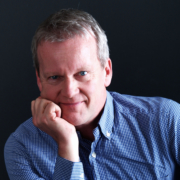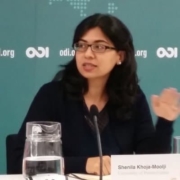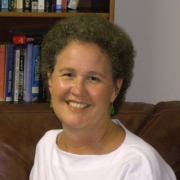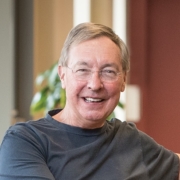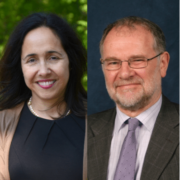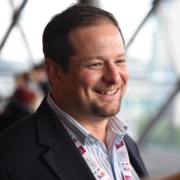World Teachers Day is next week, on Monday, October 5th. This year, the event is being held entirely online because of covid-19. With me is David Edwards to talk about the online event and some of the key people who will join. We also talk about some of the big issues that teachers face worldwide because of coronavirus.
David Edwards is the general secretary of Education International, the global federation of teachers unions representing some 32 million teachers worldwide. He is also a board member of FreshEd and a regular guest on the show. Be sure to join the World Teachers Day celebration by visiting 5oct.org. Again, that’s the number 5OCT.org. Everyone is invited.
Citation: Edwards, David, interview with Will Brehm, FreshEd, 216, podcast audio, September 28, 2020. https://freshedpodcast.com/davidedwards-3/
Will Brehm 1:29
Dave Edwards, welcome back to FreshEd.
David Edwards 1:31
Thank you very much, Will. It’s nice to be back.
Will Brehm 1:33
So, can you tell me a little bit about what world teachers day is, which will happen next week?
David Edwards 1:39
Yeah. World Teachers Day is a global celebration of teachers that started a little over – I think it was 1994. The idea was to commemorate the 1966 recommendations on the status of the teaching profession that UNESCO and the ILO (International Labor Organization) adopted. Basically, what it is, and it’s grown because it started with us and Education International, and with UNESCO, and ILO. UNICEF has since joined and partnered with us as well. And it’s really grown in prominence over the years to a sort of a trending hashtag. And in the past, we usually have lots of in person events. So, there are concerts and rallies and symposia and research launches all over the world commemorating it.
Will Brehm 2:32
When I lived in Cambodia, I remember, during World Teachers Day, they would usually hold some big rally, and there was big signs, and there was speeches by teachers and researchers. And it was really quite a nice celebration of teachers. And I always imagine that something similar was happening in all these different locations during the same day.
David Edwards 2:53
That’s right. And it would happen in most countries. And we would compile a report, we had a website, we still have the website, we put a map up and you could click and see what was happening in different places or tune in.
Will Brehm 3:04
So, I mean, obviously with COVID such events probably are not happening worldwide. So, how is Education International planning on celebrating this year?
David Edwards 3:14
That’s a really good point. In-person events, even socially-distanced ones are not happening. And since the lockdown started, we’re no longer in school and we were all around the world, kind of experiencing the same distanced existence. Our members were on a number of webinars and calls and I always assumed that it would be too difficult because of data and other things to get our members on all of these calls, but we organized things with the WHO and we did things on research on what’s happening around the ed platforms and the edu-businesses, and we were really surprised by you know, like Sita, Cambodia and others were sort of connecting in and we were doing regional ones, sectoral ones. We did like 35 of them in a four month period.
Will Brehm 4:09
Oh my gosh, so many webinars.
David Edwards 4:11
Yeah. So, death by webinar. But it was back before it became where it is now, I think. And that time, it was really exciting. And you had the chats and people were like, what’s it like for you? What are you doing? And I was on one that was webcast just for a couple hours. It wasn’t an EI one. It was some colleagues and some friends who had done. But I saw there was 150,000 teachers on it.
Will Brehm 4:41
Oh my gosh, 150,000 teachers on the same call?
David Edwards 4:45
On the same call. And you know, it was the T4 Conference that Vikas Pota put together and there were a number of us that spoke on it, Schleicher Andreas and myself, and a bunch of others and you could see that there were teachers from India and Nigeria, and they were all sort of tweeting and giving comments and interacting all sorts of different ways, it was being streamed on different platforms, not necessarily with all languages. And I was sitting there going, I’ve been told that this can’t work. And so, we came back, and we looked at it, and we got together and EI has regional offices around the world and I talked to the chiefs. It was sort of right as we were going into summer in the Northern Hemisphere. And I asked, what do you think about curating -because we can’t do World Teachers Day together physically but we’re learning a lot. And we’re really active in organizing and our members are on the front lines of this. And there’s a lot we need to tell the world about this. People are thanking teachers left and right, there are songs and really great appreciation, which is fantastic. But we ourselves as a profession are learning a lot and we wanted to think about that. And the chiefs, to their credit, said, that sounds really crazy, David, but if you want to try it. And so, we started mapping that out and looking at what actual time zones, what that would mean. And we came up with the idea of well, as the world turns, we can actually have the sun rise and set on World Teachers Day, and have a virtual mobilization, convening celebration, that hits on a lot of different important issues, and really involves a lot of teachers and communities and activists and people.
Will Brehm 6:43
So, you’re saying that this is going to be a 24-hour webinar online?
David Edwards 6:49
Yeah, I mean, webinar makes it sound painful. So, I think sometimes it feels like -it’s not a 24 hour conference, a 24 hour broadcast. It’s a 24 hour event that will have regional components to it. And you can come in and out of it at any number of places. Obviously, it’ll have some plenaries. It has some set pieces. We have Global Dialogues, which cut across the regions on major issues and topics. And we have a lot of interesting figures that have already promised to participate.
Will Brehm 7:24
Can you give us any sneak peek of some of the people who might be speaking?
David Edwards 7:29
We’re speaking with Jane Goodall. And she’s going to join us and talk to us a little bit about climate education and what’s going on and thinking about the pandemic and that. Our good friend, Pasi Sahlberg, is going to be joining us from Australia talking about the issues around play and education and the pandemic. And we have the president of Argentina who’s actually going to Zoom in in the Latin American portion. Actually, Lula’s joining us then as well. We have the president of Taiwan, ministers of education of -I think in Asia, I think it’s something like six or seven countries, Mongolia, that are coming in to join as well. We have heads of UN agencies, we have Amina Mohammed, the Deputy Secretary General of the United Nations, Henrietta Fore of UNICEF, Guy Ryder with ILO, a good friend. We have Kailash Satyarthi, Maria Ressa will be chairing a session. We have a number of people, Andreas Schleicher and, and also some less likely folks that I won’t say that are thinking about coming on and we are really hoping they will and we would kind of keep it as a bit of a surprise as we get closer to the day, we might reveal a few more big ones.
Will Brehm 8:55
Wow, that’s really quite a pretty big lineup. And so, is this an event that’s open to anyone?
David Edwards 9:05
It’s open to anyone. If you go to fiveoct.org the website is up as of today. And you can register for the event, get information about it. As the program is updated you’ll get to see as speakers are added, different ways that you can interact with it. Obviously, we’re going to have some polls, we’ll be having some opportunities to ask questions. I have the Director General of the WHO joining us to talk about vaccinations and school health and we’ll have an opportunity to interact with Dr. Tedros on that so we can actually have questions. Opportunities for teachers to upload what they’re learning themselves and some of those videos we’ll put up onto the broadcast as well.
Will Brehm 9:53
Amazing. I mean, it’s such an enormous and potentially powerful event. How many people are you sort of expecting to be joining? Is it going to be 100,000-150?
David Edwards 10:04
Yeah. I mean, the event that had 100,000 plus -and I was kind of helping a little bit and trying to get the word out about it- didn’t have organizations behind it with membership. And you know, we have 400 member organizations, and we have many partner organizations that we work closely with who have members and students and parents and can help us get the word out. It’s hard to say. I mean, we’re 32 million in the total membership of EI, that’s where everyone just completely turn it on, and reach out. And I think that at any one time, yeah, we should be able to have hundred thousand or more, at different moments throughout it.
Will Brehm 10:49
It’s really, it’s sort of like the most cutting edge idea I’ve heard for online events during the pandemic. I mean, we really have come a long way from the beginning, when we were just learning how to use Zoom, and Microsoft Teams and everything else that still stumbles, at least me up quite often. So, I want to talk a little bit about what are some of the big themes when it comes to teachers this year? What are some of the big issues and themes that you want to highlight in the teaching profession as saying, you know, this is what we should be thinking about going forward?
David Edwards 11:23
Yeah, so, I’ve been surveying the members of my executive for the past several months in terms of what they’ve been learning. And we’ve surveyed our members. We put out two surveys and reports and really listening to what’s going on. And I mean, one of the things that I think everyone understands, is that we’re not experiencing this in the same way, right? So, there was this sort of -let’s go with it, on the tech side and the connectivity side to start with, right. So, there was this assumption, I think, a false promise or hope by the edu-business tech sector, that we just need to disrupt education and everything would be better. Now, I don’t think anyone thinks that everything is better now. And so, there was massive disruption and this sort of over-promising, under-delivering on terms of tech. And what I heard from my members and their members around the world was, there was no real plan. Coverage is not equitable. You have about 47% of the world population that has no access to the internet, right? And half of them don’t even have access to stable electricity. So, there was this sort of conversation like, oh, we can just do everything distance but of course, that doesn’t work.
And then there was this whole issue around, teachers were telling us, but the ministries didn’t give us equipment, right. They were asking us to use our own phones. This will actually come up in World Teachers Day, too, because this is some of the things that we’ve been hearing about. Just sort of the unequal provision of the tools that teachers needed, you know. So, that’s a major issue. In terms of the resources, and another major issue was just in terms of consultation, dialogue voice. I mean, I think you can see it almost in every single country with the exception of a few, where everyday people would be checking the newspaper to find out, are they going back to school? Are the schools closing or opening? Are we going to be teaching with masks? Are we going to be socially-distancing? You know, I was talking to some of my affiliates in some more heavily populated and under-resourced countries going, Dave, we have a hundred kids in a classroom. That’s a joke. We haven’t had running water. I mean, hand sanitizer. How about soap and water? How are we going to, you know? And the Kenyans organized around this, the Zimbabweans -lots of people organized around it. And so, there’s that issue of lack of information, misinformation, lack of dialogue, lack of trust, and this sort of belief that teachers will just -no one really thought of teachers too and school personnel. We’ll just send them back and make sure they go back. I heard many stories, but countries where they hadn’t even thought about who decides if someone goes on sick leave, or how that’s even handled.
Will Brehm 14:20
So, like, if a teacher were to get Covid and then have to stop teaching
David Edwards 14:25
Yea. I mean, what’s the plan? No plans. Is it a doctor’s note? Can they themselves stay home?
Will Brehm 14:32
There’s an interesting thing with planning where you really do want to involve teachers, of course, through most of educational planning. And I know in normal times that even is often difficult to do. Usually these plans get concocted by ministries, by donors, by external experts, and then sort of just given down from on high to teachers to go and implement and it causes a lot of tension. With the pandemic, it really seems like there is this sort of collective shock and trauma that we’ve gone through, and people are just sort of caught like deer in headlights, just sort of frozen, and not knowing how to react, let alone plan for some future that we’re getting to as the school openings were coming closer day by day over the summer in the Northern Hemisphere. So, it’s just this really strange moment to sort of step back from and watch because it’s so predictable, right? We know a lot of what was going to happen, but yet we’re still unable to sort of act. I don’t know, it is a bit disappointing in my mind.
David Edwards 15:44
Yeah, I think it’s very disappointing and it’s very revealing, you know. Because if you think about -you know, this is FreshEd, so we have to talk a little bit about ed theory and ed policy, right. So, the proponents of highly decentralized, you know -in terms of both funding and governance systems- were completely caught flat-footed because you had countries where every district had its own, or lack of its own plan. Thinking of one in particular, but there are many, many authors, and it’s just for equity, for quality, for assessment, for basic instruction materials, curriculum, you name it. I mean, it was like, there was one region in the event when we get to the Caribbean, and I was talking to the Caribbean Union of Teachers, you know, natural disasters are sort of a thing they’ve come used to in disruptions, and so they have sort of plans when this happens, and how it works, and how they handle all of those issues.
Will Brehm 16:49
Did they implement those during COVID?
David Edwards 16:51
Yeah, to varying degrees. I think we’ll hear Jamaica, more or less. I think Trinidad, because of some things with the curve, they weren’t able to do everything they wanted but at least they have sort of a school readiness task force that immediately comes together, and they know how the information shares, and the union’s know their role, and the ministries know their role, and the parents know what’s going to happen and to be watching for this, and if there’s a change, then x, y, & z. And I was asking the Jamaican teachers about that and they said, well, it’s hit us, maybe the fact is that you never need your unions until you really need them. You never need really good school governance and leadership until you really need it. And that seems to be the story. So, the deer in the headlights is really unfortunate because, think about all the data that gets collected, right, these dashboards and these indicators but who needs to know it and what decisions does it inform has been given so much less attention. The gathering of data versus the use and the sort of thinking around that data and what decisions get informed by that data. And I think that’s what we’re seeing.
Will Brehm 18:20
Yeah, and, you know, and it’s interesting. This idea of, there’s so much to learn from systems that operate in where natural disasters are more common. I know, in Japan, for instance, the earthquakes that are always present and always on people’s mind, the preparation. When I lived in Japan, you know, we had a to go bag in our house ready to go if there was ever an earthquake. And that level of preparation was sort of dispersed through society. You know, most people heard the earthquake drill that would come every once in a while, in Tokyo, and even the school systems had preparations for earthquakes. And so, with such natural disasters, that idea of preparation is so important. And it’s so interesting and revealing, as you said, to see systems that are simply not prepared for disruption or disaster. And maybe a lot of systems have been a bit complacent over the years and underfunded, of course, and not listening perhaps to people on the ground inside schools as much as they should have been. And now we’re sort of caught in this really awful moment.
David Edwards 19:37
An overlay on top of that, you know, this whole post-truth, authoritarian, populist nightmare episode that we’re living, where what in some countries is just common decency and common sense is to listen to what scientists and experts are saying and in others that somehow gets politicized. You know, so you put poor planning, poor systems thinking, lack of equitable resource and understanding, and then you just sort of pour into that, this Trumpian -you know, it’s funny, the first time I saw a video about the mask debate. Teachers don’t have the mask debate, right. I mean, there’s people writing to me from different countries, like, what is it? Is that like a gravity debate? Is this like a flat earth thing, Dave? What’s this? I know. It’s sort of a perfect storm, in many ways. And then if you have autocrats like in the Philippines, and in Turkey, and in Russia, and autocrat wannabes, in a couple other countries, you can very easily take advantage of that vacuum of information, of that fear. And you can also, you can also sort of ram through a lot of things that you were looking for an opportunity to do that take away people’s rights or demonize a certain group against another group and pour the blame anywhere but themselves, of course. And we watched that sort of civic space unravel and that social contract unravel. And, you know, it accelerates a lot of that in those countries.
Will Brehm 21:43
In any contexts, are there any examples of where teachers have been sort of under threat during the Coronavirus pandemic where, all of a sudden, it sort of bubbled up and emerged? And maybe we can think of it as an opportune time to do some of these really nasty things to teachers, because there’s so many other distractions going on that maybe doing these awful threats might go under the radar, so to speak.
David Edwards 22:12
Yeah. There’s so much that it’s actually quite hard to track it all, right. So, the geopolitics of this are very, very hard to track at the same time, you’re having a US election and Brexit and everything else that’s happening. But I mean, take the Philippines, which is a country that I’ve been to a number of times, new anti-terror law that is being used to sort of squash journalists rights, teachers rights and basically calling for paramilitaries to go out and engage these extrajudicial killings. Our members of the ACT, the Alliance of Concerned Teachers, in the Philippines just lost an organizer about two weeks ago. She was killed just out organizing. And it’s one of several. And so, we’ve had massive upticks in the killings. We’ll be having, very soon, a webinar on that in solidarity with the Philippines. And the Philippines themselves during World Teachers Day, they’re just going to keep defying it. The teachers are going to defy it. They’re going to actually broadcast from the streets. So, if you’re awake during the Philippine section of World Teachers Day, you actually get to go out in the streets of Manila with them because they just say the risk is too high. You know, they were one of the first countries to ratify the UN Declaration of Human Rights and look out how far it’s been eroded. So, that’s one place where we’re quite concerned.
Will Brehm 23:42
It’s an interesting balancing of risk isn’t it, between COVID-19 risks and large gatherings and then the risk of being killed by an extrajudicial militia. I mean, it’s something that I can’t even begin to fathom, trying to have to balance such a risk. I mean, I feel so privileged living where I do.
David Edwards 24:07
Yeah, well, I sleep in the same house -now I’m not traveling too, it helps not being in airplanes- but I mean, the leader of one of my organizations, he can’t spend two nights in the same bed.
Will Brehm 24:18
Yeah, right. Wow.
David Edwards 24:20
You know, so I mean, we have situations like that. It’s not just there. Right around the world. I’m worried about the Hong Kong teachers and China’s crackdown there. I’m worried about what I’m seeing in Jordan right now. I’m worried about the teachers in Belarus right now. I’m quite concerned in Iran. And we get little victories. I mean, the Korean Teachers Union, Jeon Gyo Jo, were, for a very long time, critical of the Park regime. And the response to the government was to deregister them. And so, they fought it for eight years in the courts and the ILO and we backed them up and supported them and had massive campaigns about their rights. And just last week, they were re-registered. So, they won. Now the teachers of Korea have an independent teacher trade union there again. I think that gives a bit of hope to those in countries -Zimbabwe and Iran and other places where they’re under constant attack.
Will Brehm 25:23
I mean, it is good to celebrate those moments. Another positive that I’ve seen is, it seems to me there is this recognition of the value of education beyond simple future economic employment, or even issues of citizenship. I think people are really recognizing that education plays this social welfare role in society, and particularly in societies that don’t have a very big social safety net, where education is perhaps one of the only universal services that people have access to. Parents are very quickly realizing how valuable education is for that social welfare aspect. And to me, that’s quite refreshing. It takes our eyes off of just this constant focus on future economic growth through better jobs and productivity. And to me, that’s a really positive thing that’s happened,
David Edwards 26:24
Do you know, there was a time when I would be on a panel at the Bank or somewhere, and someone would be talking about the rate of return for school feeding, and that the investments just weren’t that high when we saw the learning and there was a fade out of the learnings. Are you talking about eating food? Have you ever been hungry? Have you ever tried to pay attention in school? Or have you ever tried to go through a day -? You know, and you’re in these sort of pristine and far removed places that are sort of building these assumptions into these models about what are the best interventions and some of it just seems so ridiculous now, right? Like, the whole stuff about what’s the added value of a piece of chalk, or whatever variable you add to some regression analysis. You know, if the teachers are paid, if they’re not paid, we’ve seen lower teacher effort when teachers aren’t paid on time. How do you feel when you’re not paid on time? So, all these kinds of issues. But I do agree with you that because of the sort of Black Lives Matter, you know, we had Al Sharpton come and we did a conversation with the PSI and EI talking about the sort of, okay, what are we learning in this? And what’s the kind of world we want to create? So, let’s have these conversations, you know. Let’s just call it what it is and let’s actually teach about this. I was hopeful, because I saw a lot of that sort of bubbling up around the world, really specific anti-racist curriculum teaching. And then I also saw, from students, I was very excited. I don’t know if you saw this, there was a great video that the Argentine students did about comparing now to the dictatorship. And they said, when it’s your turn, it’s your turn. Yes, the schools are closed. But for our parents, the school was a place of organizing because they were being disappeared. And when it touches you, we have to come together, and we have to learn from this moment, and we have to demand something better, we have to build something better. You know, we have to look at the most vulnerable and who’s benefiting from this. And a lot of the students have been talking about that and really mobilizing around that. That’s given me a lot of hope too but I mean, there’s still the reality that more money has been given to bailout the airline industry in the United States than all of the additional aid that has been marshaled for COVID. So, I still want there to be some economic… some companies are still…Amazon’s bottom line is doing just fine.
Will Brehm 29:08
Right? I mean, they’re not worried at all. In fact, they’re happy with this situation with everyone ordering things at home.
David Edwards 29:13
Right. I think there is a recognition that school itself as a center of a community, the institution of school and of education, if the socio-emotional, the social, the fabric, it’s irreplaceable. And it’s just great that the people, who for so long were kind of going against the brick and mortar and let’s do more online and porosity and you know, from home and things, are now saying the only way kids can learn is if they’re in school. And it’s like I’ve just been in all these Zoom calls like, can you just stop for a second and backup? I just got to tape you saying that because I have this feeling a year from now, if we’re through this, and I play this for you, you won’t even recognize yourself.
Will Brehm 29:54
And this is going to be the really interesting thing going forward is, so everyone wants to get back to some normal but at the same time, obviously we’ve learned things during this process about what education systems can be. And I think it’s about how do we make sure these new values, or not necessarily new values, just values that we’ve sort of put at the top of the priority list rather than sort of near the bottom, or we didn’t always think about, how do we keep those at the top? How do we keep mobilizing to say, like you said, schools are at the center of many communities, and we need to work to ensure that they are fair, safe places for children, where parents are involved, where teachers are empowered? I mean, to me, this is the project ahead. How do we keep that going, as we hopefully eventually shift back to more face to face? Right. I mean, this is this is going to be the great struggle, I think,
David Edwards 30:48
Yeah. And do that safely. And do that in a way that -I mean, that’s the other challenge we have right now. I don’t know if you’ve seen that we put out our forward to school guidance because there’s no doubt and that’s the other thing, all teachers want to be back in schools with their students. They are not enjoying teaching through a mask, they are not enjoying trying to figure out all these different apps and platforms that the district says one day it’s this one, next day it’s this one. We’re going to use this algorithm to grade these kids. Nope, forget that. We’re not, we’re going to teach half the kids from home and have it. Nope, no, actually, everybody’s going to be at home. Nope, actually, everyone’s coming in. Nope. The other thing is that the teachers themselves are recognizing that actually, they would like to have some things written down in a contract. They would like to have some clarity about where the edges of possibilities are, even if they want to have flexibility. Just because schools closed they don’t stop being teachers. But we’re seeing sort of an uptick in member organizations in teachers joining, because they want to have a strength, and they want to have a say. And if there isn’t going to be testing, and if there isn’t going to be tracking and tracing and all the other things that the health professionals are recommending, then they want to be able to say, well, wait a second, at what point does my life matter? At what point does my child who might be immune suppressed or something and I think that’s the other lesson we’re going to talk about on World Teachers Day, which is where you connect this line through sort of what teachers are experiencing in the pandemic, and the collective action and understanding and structures that need to come into being, or are there that just need to be strengthened, in order to act on that and make those more fair, more just, more equitable?
Will Brehm 32:46
Well, it sounds like a really fantastic event that’s coming up on October 5, is the date?
David Edwards 32:52
That’s right.
Will Brehm 32:53
So, David Edwards, thank you so much, again, for joining FreshEd.
David Edwards 32:56
Always a pleasure, Will.
Will Brehm 32:57
And I look forward to seeing you on World Teachers Day.
David Edwards 33:00
Thank you, Will. Take care.
Want to help translate this show? Please contact info@freshedpodcast.com
Have any useful resources related to this show? Please send them to info@freshedpodcast.com

